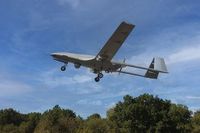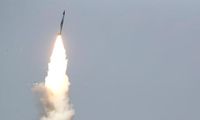The Russian Ministry of Defense has reported a significant success in repelling a massive drone attack from Ukraine, with air defense forces intercepting and destroying 107 unmanned aerial vehicles (UAVs) on the night of April 3 to April 4, 2025. This operation highlights the ongoing tensions between Russia and Ukraine, particularly as drone warfare has become a critical component of modern military engagements.
According to the Ministry of Defense, the drone assault occurred between 9:00 PM and 5:00 AM, with the majority of the UAVs being intercepted over several key regions. Specifically, 34 drones were destroyed over the Kursk region, while 30 were taken down over the Oryol region. Additional interceptions included 18 drones shot down in the Lipetsk region, 7 in Kaluga, and smaller numbers across other areas such as Rostov, Tambov, Moscow, Bryansk, Voronezh, and Tula.
In the Rostov region, acting Governor Yuri Slyusar confirmed that debris from four downed drones fell in the Neklinovsky district, but fortunately, there were no reported casualties or damage on the ground. This sentiment was echoed by other regional leaders, including Igor Artamonov of Lipetsk and Vladislav Shapsha of Kaluga, who also reported no destruction resulting from the drone fragments.
During the drone attack, a "Carpet" plan was implemented in the Moscow region, which involved redirecting aircraft to alternate airports to ensure safety amid the aerial threats. This proactive measure reflects the heightened state of alert and preparedness among Russian authorities in response to the increasing frequency and intensity of UAV attacks.
The recent attack has been described by some officials as one of the most extensive in the last three years, underscoring the escalating nature of the conflict. The air defense systems have shown considerable effectiveness, with the Ministry of Defense stating that 107 UAVs were successfully intercepted. This marks a significant operational achievement in the ongoing military confrontation.
In light of these developments, the Tver region has extended its ban on the use of UAVs, regardless of their size, until autumn. This decision aims to enhance security measures and prevent any potential threats from drones, which have become increasingly prevalent in the region. The anti-terrorist commission has also established a protocol for residents and organizations to follow if they detect UAVs, emphasizing the importance of reporting such sightings immediately.
Residents are advised to notify authorities by calling 112 or the local Ministry of Internal Affairs at 102, as well as the FSB of Russia for the Tver region at 8(4822) 32-13-61. Following these guidelines is crucial to maintaining safety and security in the area, especially given the recent uptick in drone activity.
As tensions continue to rise in the region, the situation remains fluid, and both military and civilian authorities are on high alert. The effectiveness of the air defense systems during this recent attack may serve as a deterrent against future assaults, but the potential for further escalation remains a pressing concern.
Overall, the events of the night of April 3 to April 4 serve as a stark reminder of the ongoing conflict and the evolving nature of warfare in the modern age, where drone technology plays a pivotal role. The ability to intercept and neutralize threats from the air is becoming increasingly critical as nations adapt their military strategies to counteract new forms of aggression.
This incident not only highlights the immediate threats posed by UAVs but also reflects broader geopolitical tensions that continue to shape the security landscape in Eastern Europe. As both sides prepare for potential future confrontations, the international community watches closely, aware that the ramifications of such conflicts extend far beyond the borders of the nations directly involved.
In conclusion, the successful interception of 107 UAVs by Russian air defense forces represents a significant operational victory, yet it also underscores the persistent threat posed by drone warfare in contemporary military conflicts. As the situation evolves, ongoing vigilance and preparedness will be essential in navigating the challenges that lie ahead.





